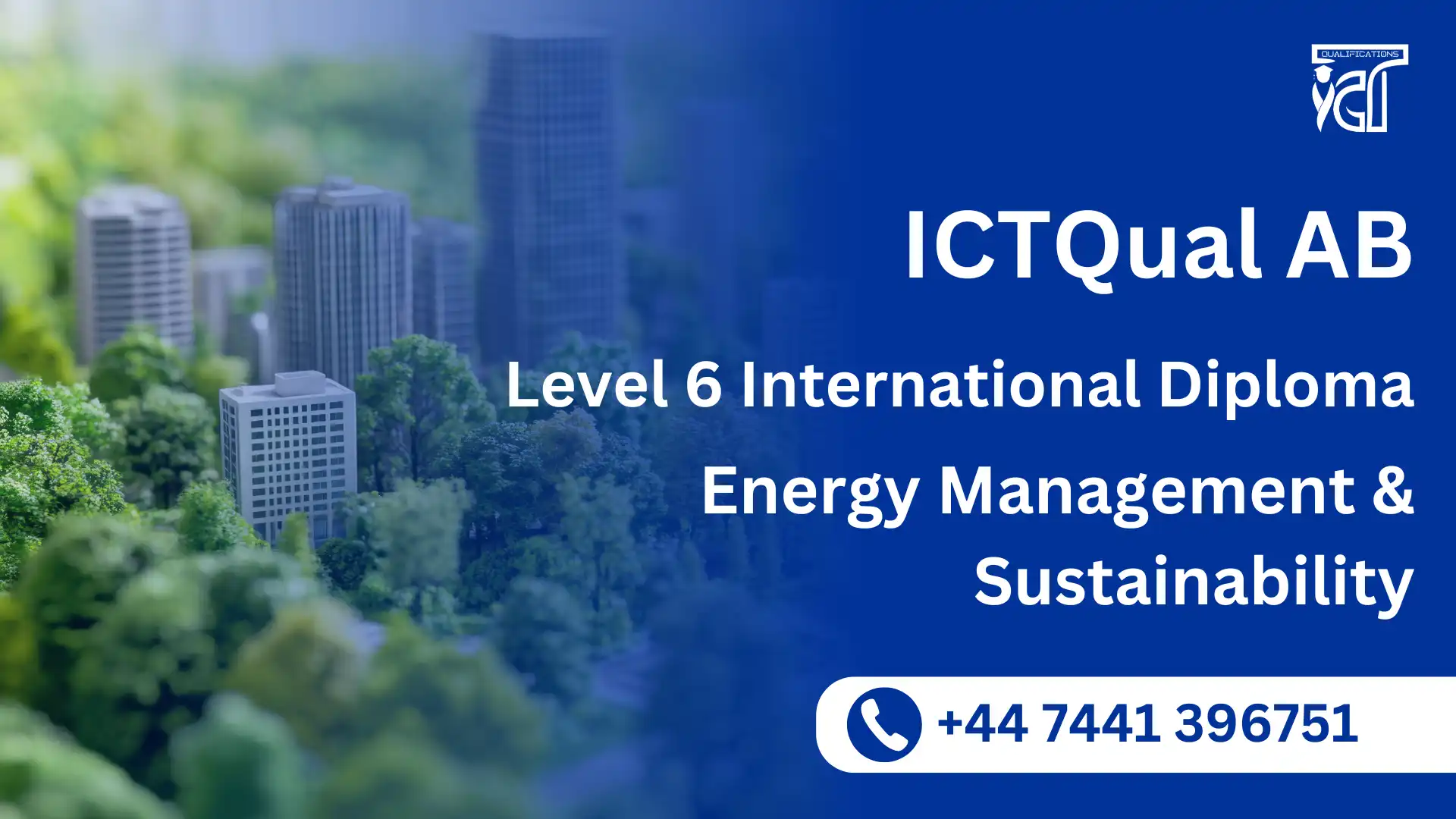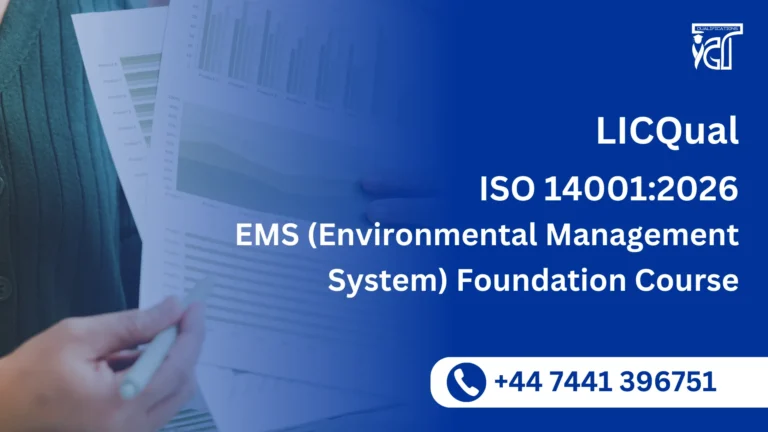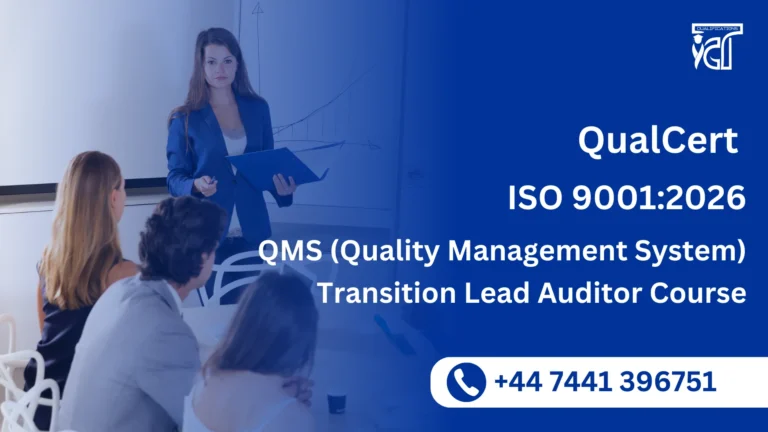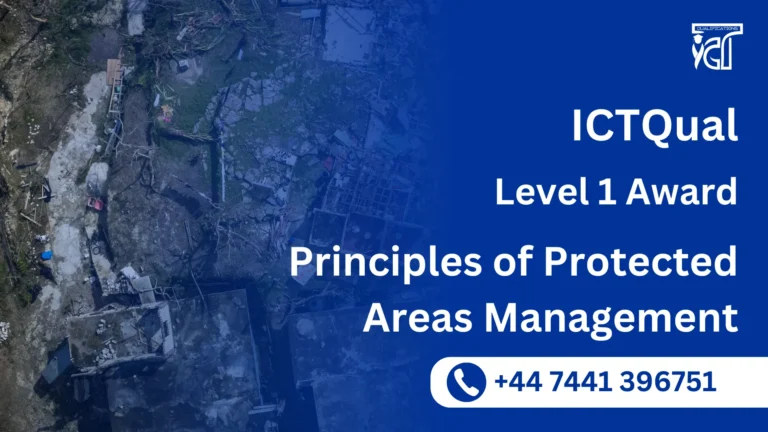The ICTQual AB Level 6 International Diploma in Energy Management and Sustainability is a comprehensive and industry-focused programme designed to equip learners with the advanced skills and knowledge required in today’s rapidly evolving energy sector. Spanning three years and comprising 360 credits, this Level 6 diploma in energy management combines theoretical understanding with practical expertise, preparing learners for complex challenges in energy efficiency, sustainability, and strategic management.
This internationally recognised qualification is ideal for both fresh learners aiming to start a career in energy and sustainability and experienced professionals seeking to formalise their expertise or transition into managerial and specialist roles. Learners will gain a deep understanding of renewable and conventional energy systems, sustainable practices, carbon management, and environmental compliance, alongside essential skills in project planning, risk assessment, and strategic decision-making. The programme emphasises hands-on application, analytical thinking, and problem-solving capabilities, ensuring learners are prepared to tackle real-world energy and sustainability challenges.
Graduates of this diploma are well-positioned for rewarding careers as Energy Managers, Sustainability Consultants, Environmental Analysts, or Operations Managers in industries worldwide. The course not only enhances technical knowledge but also fosters leadership, strategic planning, and risk management skills, enabling learners to design, implement, and manage effective energy strategies. Completing this Level 6 internationally recognised diploma provides learners with long-term professional credibility, enhanced employability, and access to advanced academic pathways, empowering them to contribute to sustainable energy solutions globally.
ICTQual AB Level 6 International Diploma in Energy Management and Sustainability
This qualification, the ICTQual AB Level 6 International Diploma in Energy Management and Sustainability, consists of 36 mandatory units.
Year 1 – Foundation in Energy Management and Sustainability
- Principles of Energy Systems
- Introduction to Sustainability Concepts
- Energy Auditing Fundamentals
- Environmental Science and Climate Principles
- Energy Conversion and Efficiency Basics
- Renewable Energy Overview
- Health, Safety, and Environmental Awareness
- Energy Measurement and Instrumentation
- Laboratory Techniques in Energy Systems
- Technical Report Writing
- Introduction to Energy Simulation Software
- Fundamentals of Carbon Management
Year 2 – Intermediate Energy Management and Sustainability
- Advanced Energy Auditing Techniques
- Sustainable Energy Technologies
- Energy Management Systems (EnMS)
- Environmental Impact Assessment and Compliance
- Energy Efficiency Optimisation Strategies
- Carbon Reduction and Climate Mitigation Practices
- Smart Grids and Energy Distribution
- Process Control and Automation in Energy Systems
- Project Planning and Technical Communication
- Quality Control and Assurance in Energy Projects
- Data Analysis and Monitoring for Sustainability
- Energy Policy, Regulations, and Standards
Year 3 – Advanced Energy Management and Sustainability
- Strategic Energy Management and Optimisation
- Energy Project Management and Leadership
- Emerging Technologies in Renewable and Sustainable Energy
- Energy Storage and Grid Integration
- Sustainability Reporting and Corporate Responsibility
- Risk Assessment and Hazard Analysis in Energy Projects
- Advanced Laboratory Techniques and Field Testing
- Carbon Accounting and Life Cycle Assessment
- Supply Chain and Logistics in Sustainable Energy
- Capstone Project in Energy Management and Sustainability
- Professional Development and Leadership in Energy
- Strategic Decision-Making for Energy Efficiency
Learning Outcomes for the ICTQual AB Level 6 International Diploma in Energy Management and Sustainability:
Year 1 – Foundation in Energy Management and Sustainability
Principles of Energy Systems
- Understand the fundamentals of energy systems and their operational principles.
- Analyse energy generation, conversion, and distribution processes.
- Evaluate system efficiency and performance metrics.
Introduction to Sustainability Concepts
- Comprehend the principles of sustainable development and environmental stewardship.
- Explore strategies to integrate sustainability into energy projects.
- Understand global sustainability challenges and solutions.
Energy Auditing Fundamentals
- Learn the methodology for conducting energy audits in industrial and commercial settings.
- Identify energy losses and inefficiencies in systems.
- Develop basic recommendations for energy optimisation.
Environmental Science and Climate Principles
- Understand key environmental processes and climate science fundamentals.
- Analyse human impacts on ecosystems and energy systems.
- Apply scientific principles to sustainable energy planning.
Energy Conversion and Efficiency Basics
- Comprehend the fundamentals of energy conversion processes.
- Evaluate system efficiency and energy loss reduction methods.
- Apply efficiency principles in practical energy systems.
Renewable Energy Overview
- Understand types of renewable energy sources and their applications.
- Analyse benefits and limitations of solar, wind, hydro, and biomass energy.
- Assess the integration of renewables into existing systems.
Health, Safety, and Environmental Awareness
- Identify potential hazards in energy systems and project environments.
- Implement safety protocols and risk mitigation strategies.
- Promote environmentally responsible practices in energy operations.
Energy Measurement and Instrumentation
- Learn methods to measure energy consumption and system performance.
- Use instrumentation and monitoring tools effectively.
- Analyse measurement data for system optimisation.
Laboratory Techniques in Energy Systems
- Conduct experiments on energy systems to validate theoretical knowledge.
- Collect and analyse experimental data for reporting.
- Apply laboratory findings to improve operational efficiency.
Technical Report Writing
- Develop skills in producing professional technical documentation.
- Communicate data, analysis, and recommendations clearly.
- Apply standard formatting, referencing, and technical writing conventions.
Introduction to Energy Simulation Software
- Gain basic proficiency in energy simulation and modelling tools.
- Model energy systems to predict performance and efficiency.
- Use simulations to support operational decision-making.
Fundamentals of Carbon Management
- Understand the principles of carbon accounting and emissions monitoring.
- Learn techniques to reduce carbon footprint in energy systems.
- Evaluate strategies for compliance with environmental regulations.
Year 2 – Intermediate Energy Management and Sustainability
Advanced Energy Auditing Techniques
- Conduct detailed energy audits using advanced methodologies.
- Identify optimisation opportunities across complex energy systems.
- Develop actionable recommendations for energy efficiency improvements.
Sustainable Energy Technologies
- Analyse innovative technologies for sustainable energy production.
- Evaluate the technical, economic, and environmental feasibility of solutions.
- Explore integration of emerging technologies into existing systems.
Energy Management Systems (EnMS)
- Understand the framework and implementation of EnMS.
- Monitor, control, and optimise organisational energy use.
- Apply standards and best practices for effective energy management.
Environmental Impact Assessment and Compliance
- Conduct environmental impact assessments for energy projects.
- Identify legal and regulatory requirements for compliance.
- Recommend mitigation strategies to reduce environmental impacts.
Energy Efficiency Optimisation Strategies
- Develop strategies to improve energy efficiency in various sectors.
- Implement process and system optimisation techniques.
- Monitor and evaluate the effectiveness of efficiency measures.
Carbon Reduction and Climate Mitigation Practices
- Analyse carbon emission sources and reduction strategies.
- Implement climate mitigation plans in energy operations.
- Evaluate progress towards sustainability and carbon reduction goals.
Smart Grids and Energy Distribution
- Understand the principles of smart grid technology and modern distribution networks.
- Analyse methods to improve reliability, efficiency, and integration of renewables.
- Implement monitoring and control strategies for smart grids.
Process Control and Automation in Energy Systems
- Apply automation technologies to optimise energy systems.
- Monitor and adjust processes to maintain operational efficiency.
- Use SCADA and control systems to support energy management.
Project Planning and Technical Communication
- Develop skills for planning and managing energy-related projects.
- Communicate technical information effectively to stakeholders.
- Apply project management principles to energy operations.
Quality Control and Assurance in Energy Projects
- Implement quality management systems in energy and sustainability projects.
- Monitor compliance with standards and regulations.
- Conduct inspections and audits to ensure operational reliability.
Data Analysis and Monitoring for Sustainability
- Analyse energy consumption and performance data.
- Use monitoring tools to support decision-making and reporting.
- Identify trends and opportunities for system optimisation.
Energy Policy, Regulations, and Standards
- Understand national and international energy policies and regulations.
- Apply standards and compliance frameworks in energy projects.
- Evaluate the impact of policy on energy management and sustainability initiatives.
Year 3 – Advanced Energy Management and Sustainability
Strategic Energy Management and Optimisation
- Develop strategies for optimising energy use across organisations.
- Analyse operational and financial factors in energy management.
- Implement initiatives for long-term efficiency and sustainability.
Energy Project Management and Leadership
- Lead energy projects from planning to execution.
- Allocate resources, manage teams, and monitor project outcomes.
- Ensure projects meet technical, financial, and sustainability objectives.
Emerging Technologies in Renewable and Sustainable Energy
- Explore cutting-edge technologies in solar, wind, and other renewable sectors.
- Evaluate integration potential and operational benefits.
- Analyse environmental and economic impacts of emerging solutions.
Energy Storage and Grid Integration
- Understand advanced energy storage solutions and applications.
- Optimise integration of storage with generation and distribution systems.
- Improve grid stability and system reliability through storage solutions.
Sustainability Reporting and Corporate Responsibility
- Prepare sustainability reports in line with international standards.
- Assess organisational environmental performance and carbon footprint.
- Develop strategies for corporate responsibility and stakeholder engagement.
Risk Assessment and Hazard Analysis in Energy Projects
- Conduct risk assessments for energy operations and projects.
- Identify hazards and develop mitigation strategies.
- Ensure compliance with health, safety, and environmental standards.
Advanced Laboratory Techniques and Field Testing
- Perform advanced experiments and field tests in energy systems.
- Collect, analyse, and interpret data to inform decision-making.
- Apply findings to optimise operations and improve sustainability.
Carbon Accounting and Life Cycle Assessment
- Conduct carbon accounting and evaluate emissions across energy projects.
- Perform life cycle assessments for products and processes.
- Recommend strategies for carbon reduction and environmental impact mitigation.
Supply Chain and Logistics in Sustainable Energy
- Manage procurement, storage, and distribution of energy resources.
- Optimise supply chains for efficiency, cost-effectiveness, and sustainability.
- Integrate logistics planning with energy management operations.
Capstone Project in Energy Management & Sustainability
- Undertake a comprehensive project integrating knowledge from all units.
- Solve real-world energy management and sustainability challenges.
- Present findings, recommendations, and solutions professionally.
Professional Development and Leadership in Energy
- Develop leadership, teamwork, and strategic decision-making skills.
- Enhance professional communication and project oversight capabilities.
- Prepare for senior operational, managerial, or consultancy roles.
Strategic Decision-Making for Energy Efficiency
- Apply analytical frameworks for informed energy decisions.
- Consider operational, financial, and environmental factors in strategy.
- Implement long-term initiatives for sustainable and efficient energy systems.
The ICTQual AB Level 6 International Diploma in Energy Management and Sustainability equips learners with advanced technical, analytical, and managerial skills to excel in the energy and sustainability sector. Graduates gain competencies to drive efficiency, implement sustainable strategies, and lead energy projects globally.
1. Advanced Knowledge in Energy Management
- Understand renewable and conventional energy systems.
- Gain expertise in energy efficiency, sustainability practices, and carbon management.
- Learn environmental compliance, policy frameworks, and regulatory standards.
- Develop skills to analyse energy consumption and optimise resources.
- Apply theoretical knowledge to real-world energy and sustainability projects.
2. Career Advancement Opportunities
- Prepare for roles such as Energy Manager, Sustainability Consultant, Environmental Analyst, or Operations Manager.
- Enhance employability in energy companies, consultancy firms, and industrial organisations.
- Build competencies for managerial, leadership, or specialist roles.
- Strengthen practical skills for energy audits, project management, and sustainable operations.
- Access global career opportunities in renewable and conventional energy sectors.
3. Professional Development and Recognition
- Earn a Level 6 internationally recognised diploma in Energy Management & Sustainability.
- Formalise prior experience for professionals seeking recognition.
- Develop leadership, strategic planning, and risk management skills.
- Gain confidence in designing and implementing energy strategies.
- Establish a foundation for continuous professional growth.
4. Practical and Industry-Focused Skills
- Apply knowledge to plan, implement, and manage energy and sustainability projects.
- Strengthen analytical, problem-solving, and decision-making abilities.
- Gain insights into energy monitoring, efficiency improvements, and sustainability initiatives.
- Build teamwork, communication, and project coordination skills.
- Prepare for real-world challenges in energy transition and sustainable operations.
5. Long-Term Benefits
- Enhanced employability and career growth in energy and sustainability roles.
- Access to advanced academic pathways and specialist certifications.
- Contribute to sustainable energy solutions worldwide.
- Build professional credibility and technical mastery.
- Prepare for leadership positions in global energy and sustainability projects
The programme is designed for learners aiming to build expertise in energy management and sustainability, whether they are starting their career or enhancing their professional experience.
1. Fresh Learners
- Individuals starting a career in energy management, sustainability, or environmental consultancy.
- Graduates in engineering, environmental science, or energy technology.
- Those seeking an internationally recognised qualification in energy and sustainability.
- Learners motivated to develop technical and practical skills for energy operations.
- Individuals aiming to contribute to global sustainability and energy efficiency initiatives.
2. Experienced Professionals
- Professionals aiming to formalise prior energy management or sustainability experience.
- Individuals seeking managerial, specialist, or leadership roles in energy and sustainability.
- Professionals wanting to expand knowledge in renewable and conventional energy systems.
- Learners preparing for project management and strategic decision-making roles.
- Individuals seeking international recognition and career advancement.
ompleting the Level 6 International Diploma in Energy Management and Sustainability opens pathways for both academic advancement and career growth.
1. Academic Progression
- Progress to Level 7 Diplomas in Energy Management, Sustainable Energy, or Environmental Leadership.
- Enrol in Master’s programmes in Energy Management, Sustainable Development, or Environmental Strategy.
- Access specialist certifications in renewable energy, sustainability auditing, and carbon management.
- Build a foundation for research or advanced professional studies.
- Prepare for continuous learning and professional development.
2. Career Advancement
- Opportunities as Energy Manager, Sustainability Consultant, Environmental Analyst, or Operations Manager.
- Work in global energy companies, industrial organisations, and consultancy firms.
- Manage energy efficiency projects, sustainability programmes, and operational optimisation.
- Prepare for senior, managerial, or specialist roles.
- Enhance international employability and professional credibility.
3. Industry Specialisation
- Develop expertise in renewable and conventional energy systems, carbon management, and sustainability practices.
- Strengthen skills in energy audits, policy compliance, and strategic planning.
- Prepare for critical decision-making and operational management roles.
- Contribute to sustainable energy solutions and organisational efficiency.
- Gain competencies for leadership positions in the global energy sector.
As an approved ICTQual AB centre, we offer two flexible certification pathways designed to meet the needs of both experienced professionals and fresh learners. These pathways ensure all learners can achieve the Level 6 International Diploma in Energy Management & Sustainability and gain an internationally recognised qualification.
Route 1: Experienced Professionals
- This pathway is designed for learners with at least six years of verifiable professional experience in energy management, sustainability, environmental strategy, or related sectors.
- It recognises prior expertise, allowing experienced learners to fast-track their diploma completion without compromising on quality or learning outcomes.
- Focuses on advanced modules, strategic projects, and applied learning, enabling learners to consolidate their existing knowledge while gaining additional skills in energy efficiency, carbon management, and sustainable practices.
- Ideal for professionals seeking managerial, leadership, or specialist roles within the energy and sustainability sector.
- Successful completion provides a globally recognised Level 6 qualification, enhancing career prospects, professional credibility, and international employability.
Route 2: Fresh Learners
- Designed for learners new to energy management and sustainability, including recent graduates or individuals seeking a career transition into the energy sector.
- Requires completion of 36 structured assignments covering all core units of the diploma, ensuring a comprehensive understanding of both theoretical concepts and practical applications.
- Emphasises hands-on skills, analytical thinking, and real-world application, preparing learners to tackle energy management, sustainability initiatives, and environmental challenges confidently.
- Provides a strong foundation for learners to progress into specialist roles, managerial positions, or advanced academic studies in energy and sustainability.
- Graduates earn a fully accredited Level 6 diploma, opening pathways for professional growth and global career opportunities.
Entry Requirements
To ensure learners are fully prepared for the ICTQual AB Level 6 International Diploma in Energy Management and Sustainability, the entry requirements are designed to accommodate both fresh learners and experienced professionals, taking into account age, education, professional experience, language proficiency, and essential skills.
1. Minimum Age
- Learners must be 18 years or older at the time of enrolment.
- This ensures learners have the maturity and commitment needed to engage with advanced energy management and sustainability concepts.
2. Educational Background
- A Level 5 Diploma or equivalent in relevant fields is recommended, such as:
- Energy Management
- Environmental Science or Sustainability
- Engineering (Mechanical, Electrical, or Energy-focused)
- Renewable Energy Technologies
- Candidates should have a foundational understanding of mathematics, physics, and energy principles.
- For learners without formal qualifications, Route 1 (Experienced Professionals) allows entry based on verifiable work experience.
3. Professional Experience
- Route 1: Experienced Professionals
- Requires a minimum of six years of verifiable professional experience in energy management, sustainability, environmental consultancy, or related sectors.
- Experience should demonstrate knowledge of energy systems, sustainable practices, regulatory compliance, and project management.
- Recognises prior expertise and enables faster diploma completion.
- Route 2: Fresh Learners
- No prior professional experience is required.
- Learners must complete 36 structured assignments covering all core units to ensure full understanding of energy management and sustainability practices.
4. Language Proficiency
- Competence in English is essential for understanding course materials, completing assignments, and engaging with tutors.
- Recommended: IELTS 5.5 or equivalent for non-native English speakers.
- Ability to read and comprehend technical manuals, sustainability reports, and regulatory guidelines is required.
Register Now
Qualification Process
Qualification Process for the ICTQual AB Level 6 International Diploma in Energy Management and Sustainability
- Self-Assessment:
Begin by evaluating your eligibility to ensure you meet the qualification requirements, including work experience, knowledge, and language proficiency. - Registration:
Complete your registration by submitting the required documents, including a scanned copy of a valid ID, and paying the registration fee. - Induction:
An assessor will conduct an induction to confirm your eligibility for the course and explain the evidence requirements. If you do not meet the criteria, your registration will be cancelled, and the fee will be refunded. - Assignments & Evidence Submission:
Provide all assignments and the necessary evidence based on the assessment criteria outlined in the course. If you are unsure of the required evidence, consult with the assessor for guidance on the type and nature of evidence needed. - Feedback and Revision:
The assessor will review your submitted evidence and provide feedback. Evidence that meets the criteria will be marked as “Criteria Met,” while any gaps will be identified. You will be asked to revise and resubmit if needed. - Competence Evidence:
Submit final evidence demonstrating that all learning outcomes have been met. This evidence will be marked as “Criteria Met” by the assessor once it is satisfactory. - Internal Quality Assurance (IQA):
The Internal Quality Assurance Verifier (IQA) will review your evidence to ensure consistency, quality, and compliance with standards. - External Verification:
The IQA will submit your portfolio to ICTQUAL AB External Quality Assurance Verifiers (EQA) for final confirmation. The EQA may contact you directly to verify the authenticity of your evidence. - Certification:
Upon successful completion of all checks, ICTQUAL AB will issue your official certificate, confirming that you have attained the ICTQual AB Level 6 International Diploma in Energy Management and Sustainability.







